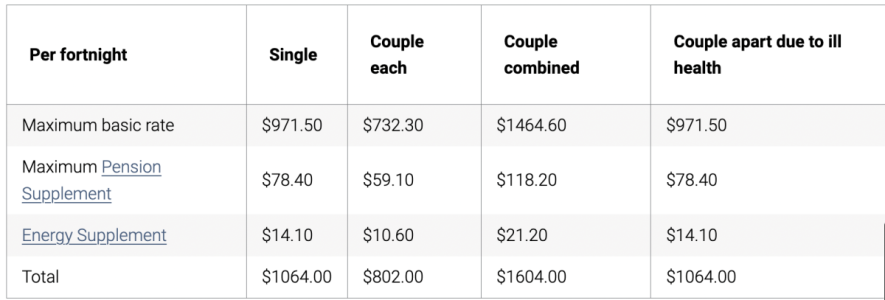Australian Seniors React To Upcoming Change: Pension Age and Income Tests Alterations on July 1, 2023
- Replies 34
Greetings, members! As always, we strive to provide essential and valuable information to help you live your best life. Today, we're here to discuss upcoming changes to the aged pension rules, which could potentially benefit thousands of senior Australians. We’ll also look at the reactions from Australian seniors.
Starting July 1, 2023, the government will implement new measures affecting pension age, income, and asset tests aimed at encouraging seniors to work longer and alleviate Australia's labour shortages.
‘Age pensioners are struggling to make ends meet,’ says Retirement Essentials Chief Customer Officer James Coyle.
The threshold changes will enable more people to qualify for the age pension. ‘At a time of cost-of-living crisis, they will be very welcomed.’
So, let's dive into the details of how these rule changes could impact you and explore some additional resources and strategies to help you adapt.
Currently, pensioners are tested on their income and assets when they apply for payments. Centrelink uses the test that results in the lowest payment for the applicant, according to Coyle.
Before we begin, here's a brief overview of the current eligibility requirements:
- Singles can earn up to $2,318 per fortnight, while couples living together can earn $3,544 combined.
- Single homeowners can have $634,350 worth of assets besides their home for a pension payment, and couples can have $954,000.
- Single non-homeowners must have less than $859,250 in assets or $1,178,500 for a couple to get approval for a full pension.
However, starting on July 1, 2023, many seniors who were previously ineligible for pensions due to their assets value or income can now claim part payments. Similarly, those receiving part payments may now be eligible for full payments.
However, Australians born on or after January 1, 1957, will need to reach 67 years of age before becoming eligible for the pension under the new rules.
Here are some of the significant July 1, 2023 changes:
- Singles can earn up to $204 per fortnight, and couples can earn $360 before losing their full pension.
- Single homeowners can have about $301,750 worth of assets before their full pension payment is reduced, while single non-homeowners can have $543,000.
- Homeowning couples on a full pension can have $451,500 worth of assets before shifting to a part payment, or $693,500 for non-homeowner couples.
These rule changes may result in new pension payment opportunities for some seniors. Singles will see an income threshold increase to $2,332 per fortnight and couples to $3,568.
Additionally, single homeowners can have $656,500 of assets, and couples can have $986,500 before being deemed ineligible for payment. For non-homeowners, singles can have $898,500 in assets and couples $1,228,500.
Now, you may remember we wrote about some of these changes recently. You can read more here.
Our beloved SDC members were kind enough to share their thoughts, and we’ve included a few below for your convenience.
Member @helooney3 said: ‘The rich will get richer and the poor will get poorer. I have a $180 fee increase coming up in July and no Pension increase to support it … Definitely not good, especially in light of the huge cost of living increase. Every Pensioner should be getting a substantial increase. Come on, Government, show yourselves strong and give us a $100 per week increase.’
Member @Elyna said: ‘This is so unbalanced. As a single pensioner, I pay the same amount of rates, insurance, etc etc, as a couple… We need a significant rise in the age pension. We worked for this all our lives!!!’
Member @Gsr said: ‘Don’t forget that couples have more everyday costs, medications, food, medical needs, clothes, toiletries. Two people use more electricity and water as well. All this adds up… I would like to see all pensioners receive a substantial rise.’
Considering these changes, let’s explore some additional strategies and resources to help you navigate the upcoming alterations to your pension.
1. Budgeting Tips and Saving Money
One way to stretch your pension payments further is by taking advantage of discounts available through our Seniors Discount Club Discount Directory. Additionally, create a monthly budget that outlines your necessary expenses and track your spending to help you manage your finances better and identify areas where you can cut costs.
2. Personal Finance Success Stories
Many seniors have successfully navigated changes in pension rules in the past. Take inspiration from their experiences, and reach out to friends or local community groups to share advice and practical tips.
3. Hobbies and Side Hustles
If traditional employment is not your cup of tea, consider picking up a hobby or side hustle that can earn extra income. Some popular options include gardening, crafting, pet sitting, or freelance writing. These activities can supplement your pension while keeping you active and engaged.
4. Stay Informed with Helpful Resources
Stay updated on future pension changes and get further help managing your retirement finances by visiting reputable sources, such as the Australian Government's Department of Social Services website or the official Centrelink website.

Financial adviser Noel Whittaker recommends that seniors prepare for five years before becoming pension eligible and to seek professional advice to maximise potential payments.
So, dear members, now is the time to get informed and prepare for these upcoming changes. By understanding how they impact your situation, you can plan and make the necessary adjustments for a more comfortable and fulfilling retirement. We're here to support you every step of the way!
Starting July 1, 2023, the government will implement new measures affecting pension age, income, and asset tests aimed at encouraging seniors to work longer and alleviate Australia's labour shortages.
‘Age pensioners are struggling to make ends meet,’ says Retirement Essentials Chief Customer Officer James Coyle.
The threshold changes will enable more people to qualify for the age pension. ‘At a time of cost-of-living crisis, they will be very welcomed.’
So, let's dive into the details of how these rule changes could impact you and explore some additional resources and strategies to help you adapt.
Currently, pensioners are tested on their income and assets when they apply for payments. Centrelink uses the test that results in the lowest payment for the applicant, according to Coyle.
Before we begin, here's a brief overview of the current eligibility requirements:
- Singles can earn up to $2,318 per fortnight, while couples living together can earn $3,544 combined.
- Single homeowners can have $634,350 worth of assets besides their home for a pension payment, and couples can have $954,000.
- Single non-homeowners must have less than $859,250 in assets or $1,178,500 for a couple to get approval for a full pension.
However, starting on July 1, 2023, many seniors who were previously ineligible for pensions due to their assets value or income can now claim part payments. Similarly, those receiving part payments may now be eligible for full payments.
However, Australians born on or after January 1, 1957, will need to reach 67 years of age before becoming eligible for the pension under the new rules.
Here are some of the significant July 1, 2023 changes:
- Singles can earn up to $204 per fortnight, and couples can earn $360 before losing their full pension.
- Single homeowners can have about $301,750 worth of assets before their full pension payment is reduced, while single non-homeowners can have $543,000.
- Homeowning couples on a full pension can have $451,500 worth of assets before shifting to a part payment, or $693,500 for non-homeowner couples.
These rule changes may result in new pension payment opportunities for some seniors. Singles will see an income threshold increase to $2,332 per fortnight and couples to $3,568.
Additionally, single homeowners can have $656,500 of assets, and couples can have $986,500 before being deemed ineligible for payment. For non-homeowners, singles can have $898,500 in assets and couples $1,228,500.
Now, you may remember we wrote about some of these changes recently. You can read more here.
Our beloved SDC members were kind enough to share their thoughts, and we’ve included a few below for your convenience.
Member @helooney3 said: ‘The rich will get richer and the poor will get poorer. I have a $180 fee increase coming up in July and no Pension increase to support it … Definitely not good, especially in light of the huge cost of living increase. Every Pensioner should be getting a substantial increase. Come on, Government, show yourselves strong and give us a $100 per week increase.’
Member @Elyna said: ‘This is so unbalanced. As a single pensioner, I pay the same amount of rates, insurance, etc etc, as a couple… We need a significant rise in the age pension. We worked for this all our lives!!!’
Member @Gsr said: ‘Don’t forget that couples have more everyday costs, medications, food, medical needs, clothes, toiletries. Two people use more electricity and water as well. All this adds up… I would like to see all pensioners receive a substantial rise.’
Considering these changes, let’s explore some additional strategies and resources to help you navigate the upcoming alterations to your pension.
1. Budgeting Tips and Saving Money
One way to stretch your pension payments further is by taking advantage of discounts available through our Seniors Discount Club Discount Directory. Additionally, create a monthly budget that outlines your necessary expenses and track your spending to help you manage your finances better and identify areas where you can cut costs.
2. Personal Finance Success Stories
Many seniors have successfully navigated changes in pension rules in the past. Take inspiration from their experiences, and reach out to friends or local community groups to share advice and practical tips.
3. Hobbies and Side Hustles
If traditional employment is not your cup of tea, consider picking up a hobby or side hustle that can earn extra income. Some popular options include gardening, crafting, pet sitting, or freelance writing. These activities can supplement your pension while keeping you active and engaged.
4. Stay Informed with Helpful Resources
Stay updated on future pension changes and get further help managing your retirement finances by visiting reputable sources, such as the Australian Government's Department of Social Services website or the official Centrelink website.
Key Takeaways
- Thousands of senior Australians are set to benefit from changes to the aged pension on July 1, 2023, with adjustments to the pension age, income, and asset test thresholds.
- The government aims to encourage more seniors to continue working and ease Australia's labour shortage amid a cost-of-living crisis.
- The new rules increase the income and asset thresholds to qualify for pension payments, enabling more people to receive either full or part payment for the aged pension.
- Financial experts advise seniors to prepare for pension changes five years before they are eligible and seek professional advice to maximise their potential benefit.
Financial adviser Noel Whittaker recommends that seniors prepare for five years before becoming pension eligible and to seek professional advice to maximise potential payments.
So, dear members, now is the time to get informed and prepare for these upcoming changes. By understanding how they impact your situation, you can plan and make the necessary adjustments for a more comfortable and fulfilling retirement. We're here to support you every step of the way!
Last edited:









